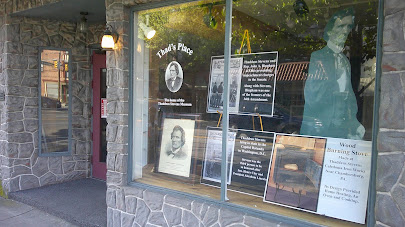Thaddeus Stevens Society to meet November 3 at Caledonia State Park
The Thaddeus Stevens Society will meet on Sunday, November 3, at 1 p.m. at Caledonia State Park at the intersection of Routes 30 and 233 near Chambersburg. The meeting will be a potluck cookout in the picnic area near the Thaddeus Stevens Blacksmith shop. Hot dogs, hamburgers, chips and drinks will be provided. If you plan to attend, please respond by return email and include what dish you might be bringing, though it is not required.
Plaques for lifetime members will be presented and nominations for officers will be taken. Election of officers will be held at the 2025 spring meeting. There will also be discussion of efforts to increase the endowment of the Thaddeus Stevens Museum and the restructuring of the Lancaster cemetery where Stevens is buried.
Please give to the museum endowment fundPlease make a donation to the endowment fund for the Thaddeus Stevens Museum to ensure it will continue to exist for generations to come.
The Society is participating in the November 7 Giving Spree in Adams County and we are asking people to contribute to the "Forever Fund" for the Stevens Society, which is number 103 on the giving form that can be found at this link: GivingSpree You can either mail in the form or send it in online on November 7 from 12:01 a.m. to midnight.
The museum, which opened in March, has been an unmitigated success. Located at 46 Chambersburg St. in the heart of Gettysburg, the museum has had hundreds of visitors. It is always great to see the amazement in people's faces when they learn about this very important person or to see the gratitude of existing Stevens admirers that there is at long last a museum about this hero of humanity.
But we have to plan for the future and that is why it is so important to have a well funded endowment fund. To set an example, I, Ross Hetrick, will be contributing $1,000 to the fund on November 7. While I don't expect members and supporters to make such a large donation, a lot of small contributions can make a big difference. Thanks for anything you can do.
"An Uncommon Woman" is a book of speculation and overstatement
An Uncommon Woman, a biography of Lydia Hamilton Smith, by Mark Kelley is a very speculative book that tries desperately to prove that there was a romantic relationship between Smith and Thaddeus Stevens despite both of them denying it.
The speculation starts on the cover, which features a painting of a woman who is purported to be Smith. This painting has been used to suggest that Stevens had the painting done because of his alleged romantic involvement with Smith. But it is not known where this painting came from, who painted it or who it was. The unsigned painting was found 45 years after Stevens's death and without a bit of documentation, a Lancaster historian in 1913 said it was a painting of Smith commissioned by Stevens. He also said it was done by artist Jacob Eichholtz, who died six years before Smith started working for Stevens.
Yet, this lack of evidence does not prevent Kelley from weaving an elaborate story that Stevens might have commissioned the painting when both he and Smith lived in Gettysburg and Smith was married to Jacob Smith. "We don't know the answers to these questions," Kelley writes, "but the mere possibility that Thaddeus Stevens might have commissioned Jacob Eichholtz to paint Lydia's portrait -- after she was married -- makes me wonder what the true nature of her relations to Stevens was." If Kelley does not know the answers, he is not allowed to make up a story.
The cover picture is followed by an outrageous claim at the beginning of the introduction that, "In the mid-nineteenth century, Lydia Hamilton Smith was one of the most widely known women in this country." What little fame Smith had was wholly due to her association with Stevens and it was fame that she would rather not have had.
During his lifetime, Stevens was accused of being against slavery and for equality because he was getting the favors of his biracial housekeeper. Both Stevens and Smith denied this and Smith, a devout Roman Catholic who very proud of her good reputation, vehemently denied the accusation. This is documented in the February 3, 1866 edition of the Lancaster Intelligencer Journal, which recounts a visit by Smith to the newspaper that had printed such libels.
In a very condescending article entitled, "A Distinguished Visitor," Smith told a group of editors she was not Stevens's "idol" and white people she knew could vouch for her good character. After a contentious conversation in which the editors said she should have sent the white people, Smith said, "if - if ever - if ever my name appears in your paper again - I will - will - cowhide the editor." [The italics was in the original article.]
This racist slur against Stevens and Smith faded away after Stevens death, as did other baseless accusations, and was not included in early biographies. But the infamous 1915 silent movie, Birth of a Nation, revived the libel as the film sought to portray Stevens as a villain intent on punishing the south. In one scene it shows the Stevens character caressing his housekeeper and a title appears saying: "A great man's weakness is the blight of a nation."
After that influential movie, Stevens biographers felt compelled to address the Stevens/Smith relationship and most found there was no evidence to suggest a romantic relationship. This includes the most recent Stevens biography in 2021 by respected historian Bruce Levine. Yet, Kelley waves away all these findings along with both Stevens and Smith denials and contends they were a romantic couple, accepting the racist slur against them.







